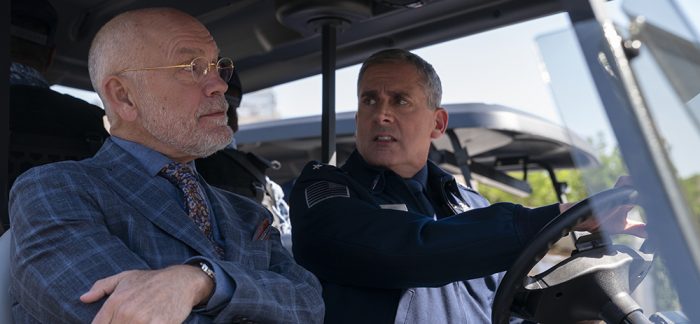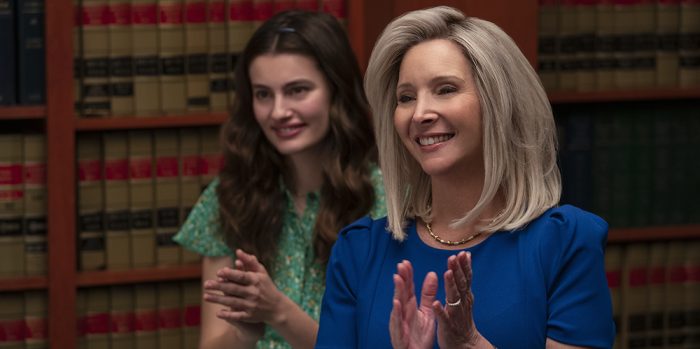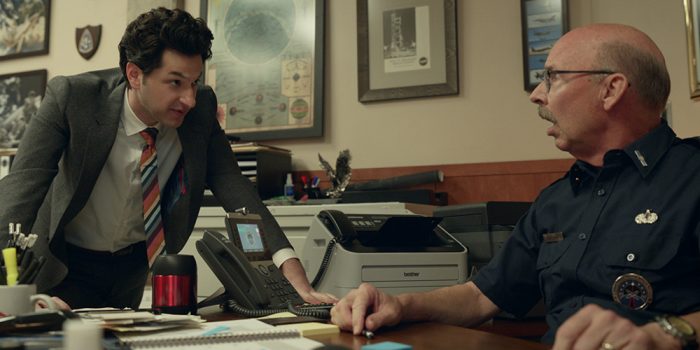'Space Force' Review: Netflix's Comedy Series Shoots For The Moon, But Can't Stay On Trajectory
The last time actor Steve Carell and writer/producer Greg Daniels teamed up, it resulted in The Office on NBC, a show that initially stumbled in the shadow of its British predecessor but became one of the greatest television comedies of the 21st century. Now Carell and Daniels have ventured out on their own with Space Force, an original workplace comedy coming to Netflix that takes a cue from the real life creation of a space warfare branch of the U.S. Armed Forces. Unfortunately, while the series literally shoots for the moon, it has a hard time staying focused in a number of ways, from a fluctuating, inconsistent comedic tone to meandering, insignificant sideplots. It's not a complete mess, but it certainly doesn't feel ready for launch.
Air Force pilot Mark Naird (Steve Carell) has recently been appointed to lead Space Force after being named a four-star general, making him part of the Joint Chiefs of Staff in the United States Department of Defense and giving him a direct line to the president as he establishes a military presence on the moon. "Boots on the moon" is the buzz phrase that best captures the essence and spirit of what POTUS wants from Naird. Though he's nonplussed about the job, Naird is prepared to accept his new responsibility, because that's what he's been ordered to do. This is a guy who crisply straightens the covers on his bed when he gets up for a drink of water in the middle of the night, even though he will be coming right back to bed where his wife (Lisa Kudrow) is still in bed next to him, visibly and tearfully unhappy with their family being uprooted from Texas to the middle of nowhere in Colorado.
We don't get any time to deal with that conflict though, because Space Force suddenly jumps ahead one year with Naird already comfortable in his new position. Well, maybe not comfortable, because it's clear that he still isn't the most knowledgeable person when it comes to space and the science behind it. But there's a massive, expensive Space Force base and campus that has been built in Colorado out of an old NORAD facility, and they're on the verge of a big launch test in their efforts to militarize the moon. Why the sudden time jump? Well, I'm assuming it's mostly to avoid the rigmarole of watching Naird get acquainted with his new position and the boring establishment of Space Force itself. It also allows for an odd story element that manifests itself throughout the first season, but feels contrived and out of place.
As with any pilot, the first episode does a fine job of introducing us to all the characters we'll be following throughout the series, but it also provides a glimpse into what will become the show's strengths and weaknesses along the way. Each character in the ensemble either adds to the story in a meaningful and logical way that helps progress the overarching story or completely throws off the show's rhythm and never goes anywhere.

The most satisfying component of Space Force is John Malkovich as Dr. Adrian Mallory, the chief scientific advisor to General Naird. He's staunchly against militarizing the moon, but if it's going to be done, he wants to make sure it's done right. Malkovich is the MVP of Space Force, grounding it enough for some of the sillier parts to never feel too unbelievable. He never feels like he's trying to be funny, but his portrayal of a character who finds himself in increasingly frustrating scenarios comes off even funnier because of that. Only Malkovich can emphatically say likes like, "These are combat scissors, soldier," and make it both believable and hilarious.
Malkovich and Carell are fantastic foils for each other, as the former acts as the voice of reason to the latter's stubborn military personality, which still comes off feeling like a variation on Michael Scott from The Office. While Carell's character in Space Force isn't nearly as bumbling or embarrassing as Michael Scott, his over-confidence in Space Force and frequent refusal to listen to science and reason hurts Carell's efforts to put on a somewhat gravelly voice in an effort to be a different kind of character. However, the development of their relationship throughout the first season is one of the more polished parts of Space Force, and it's where the show feels the most comfortable.
On the other side of the equation, there's General Naird's family, who are nothing but distractions from what works best in Space Force. Along with Lisa Kudrow as Naird's wife Maggie, there's also Diana Silvers (Booksmart) as his rebellious, miserable teenage daughter Erin. Since she was forced to move to Colorado against her will, she carries a lot of typical teenage angst, and has no problem doing things just to piss off her father, like dating a Russian member of Space Force who is much older than she is. The only problem is Erin's storyline often feels like an unnecessary tangent that doesn't add much to the overall story, especially when it comes to her contrived love connections. While there is a father-daughter arc that unfolds through the first season, it could have easily been left on the cutting room floor and it wouldn't have made a difference. The only reason for Erin's existence appears to be as a hurdle for General Naird to overcome, as well as a way to give the spotlight to one of the better supporting characters in the series.
Tawny Newsome plays Angela Ali, a young pilot who has a lot of ambition to rise in the ranks of Space Gorce, but despite making it through school with flying colors, lacks real combat experience. Ali's arc ends up tying closely with General Naird as she goes from flying him around to important meetings to being a key part of the first crew to head back to the moon. An early episode allows us to spend a significant amount of time with her when she's tasked with keeping an eye on Erin after she gets suspended from school on the day her father needs to testify in a session of congress about the budget for Space Force.
Speaking of incomplete characters, you might have noticed that there hasn't been much to say about Lisa Kudrow even though she plays General Naird's wife Maggie. That's because her role is minimal in the series for a reason that you have to find out yourself by watching the show. This is an element of the series that has been kept under wraps, and it's a detail that feels like the show's biggest misfire, especially when the season finale rolls around. Every aspect of her character feels like it's from a completely different show, and nothing about it works at all.
Along those same lines, there is a much smaller role for the late Fred Willard, who plays General Naird's father. This part of the show feels bittersweet and may have ultimately been hurt by the actor's recent death. That's because Naird's father is clearly suffering from dementia, which is used for a couple laughs during phone calls the father and son share. The only problem is that you only end up feeling bad for his parents because they're stuck in Washington DC and their son clearly doesn't have the time to dedicate to their care, leaving hospital caretakers to be responsible for them. What's even weirder is that Naird's parents are only in the series for a few minutes, and there's no real resolution of their part, or lack thereof, in Naird's storyline. Perhaps this was intended to be tackled more in the second season, but now that Willard has passed away, one can't help but wonder if the storyline will be scrapped entirely.
Somewhere in the middle, you have some solid supporting characters who add some decent workplace comedy components to the series. Don Lake, a favorite of Christopher Guest, plays General Naird's one-star general assistant Brad Gregory, who means well but often falls short of doing his job well. Jimmy O. Yang works well as Dr. Chen, one of the leading scientists in Space Force who strikes up one of the show's romances while Ben Schwartz brings high energy as the Space Force's publicist and social media manager F. Tony Scarapiducci, who is always referred to as "Fuck Tony" by the rest of Space Force. Meanwhile General Kick Grabaston (Noah Emmerich) and the rest of the Joint Chiefs played by Patrick Warburton, Jane Lynch, Diedrich Bader, and Larry Joe Campebll are always giving him a hard time along with the demanding Secretary of Defense played by Veep veteran Dan Bakkedahl, and any scenes involving them are an instant highlight.
 Veep is clearly the show that Space Force seems to be trying to emulate the most. But the show isn't quite sharp or clever enough in its comedy to match the consistent and frequent gut-busting laughs that come from the Veep's snappy dialogue and venomous insults. That's not to say the show doesn't come with a lot of laughs, because there are some truly great lines and recurring gags here and there. But it still falls short of having hitting as hard or being as memorable as other comedies in the same vein, such as Silicon Valley or even the unfortunately short-lived Enlisted. And since it doesn't land in Veep's territory with the insults and crude dialogue, it makes the profanity feel forced and unnecessary at times, and even the "Fuck Tony" gag runs its course quickly.Space Force is at its best when characters have to overcome a single incident that dominates an entire episode, like figuring out how to repair a satellite using a trained chimpanzee, squaring off the the Air Force in a BB gun training exercise, or trying to avoid getting new uniforms courtesy of the First Lady. There's great comedy to be found in episodes that take a humorous approach to the likes of The Martian, Apollo 13, and Armageddon, but the show stumbles too much when it tries to inject the family drama and feels like it drops the comedy ball when large-scope plot developments begin to arise towards the end of the first season. It also seems like the writers intentionally avoided what would have been incendiary political humor, opting to make vague references to the Trump presidency as part of this world, especially with off-handed references to POTUS tweeting and FLOTUS wanting to give right-wing fashion companies some exposure. There's even a proxy for Alexandra Ocasio-Cortez in a couple episodes with Ginger Gonzaga playing a New York congresswoman named Anabela Ysidro-Campos. But beyond that, the series stays out of the politics of it all, for better or worse.
Veep is clearly the show that Space Force seems to be trying to emulate the most. But the show isn't quite sharp or clever enough in its comedy to match the consistent and frequent gut-busting laughs that come from the Veep's snappy dialogue and venomous insults. That's not to say the show doesn't come with a lot of laughs, because there are some truly great lines and recurring gags here and there. But it still falls short of having hitting as hard or being as memorable as other comedies in the same vein, such as Silicon Valley or even the unfortunately short-lived Enlisted. And since it doesn't land in Veep's territory with the insults and crude dialogue, it makes the profanity feel forced and unnecessary at times, and even the "Fuck Tony" gag runs its course quickly.Space Force is at its best when characters have to overcome a single incident that dominates an entire episode, like figuring out how to repair a satellite using a trained chimpanzee, squaring off the the Air Force in a BB gun training exercise, or trying to avoid getting new uniforms courtesy of the First Lady. There's great comedy to be found in episodes that take a humorous approach to the likes of The Martian, Apollo 13, and Armageddon, but the show stumbles too much when it tries to inject the family drama and feels like it drops the comedy ball when large-scope plot developments begin to arise towards the end of the first season. It also seems like the writers intentionally avoided what would have been incendiary political humor, opting to make vague references to the Trump presidency as part of this world, especially with off-handed references to POTUS tweeting and FLOTUS wanting to give right-wing fashion companies some exposure. There's even a proxy for Alexandra Ocasio-Cortez in a couple episodes with Ginger Gonzaga playing a New York congresswoman named Anabela Ysidro-Campos. But beyond that, the series stays out of the politics of it all, for better or worse.
While Space Force starts with some promise and a decent ensemble of characters, there are too many distractions outside of the show's primary premise to make it work smoothly as a whole. But even beyond that, the mere premise of Space Force starts to feel too big, and it ends up swallowing up a lot of the comedy real estate and taking the show in a far less interesting direction towards the end of the first season, all at a speed that makes it all rather unbelievable. The final moments of the first season finale feel so messy and outside of the wheelhouse of the best parts of the show that I have no idea what's going to happen with a prospective second season, and it will take a lot convincing for me to have a desire to find out.
***
Space Force arrives on Netflix on May 29, 2020.
